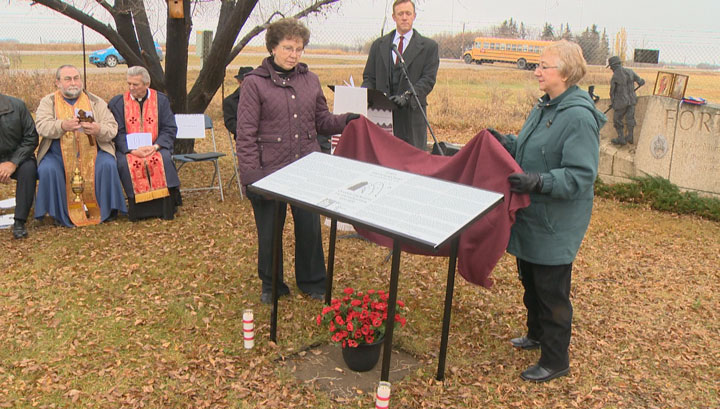SASKATOON – A tribute to 65 immigrants who were placed in an internment camp almost a century ago now sits just southwest of Saskatoon.

A special ceremony honouring the immigrants took place Tuesday at the Saskatchewan Railway Museum.
In 1919, the 65 victims of Canada’s first nation-wide internment operations during World War I were situated in a site formally known as Eaton, where the museum now sits.
They worked there for 24 days.
The immigrants came from overseas countries that Canada considered its enemy during the war, like Germany, Austria-Hungary and Bulgaria.

Get daily National news
Roughly 8,500 immigrants were placed in camps across the country including 5,000 ethnic Ukrainians.
“The important lesson is that sometimes in times of distress, conflict and so on, decisions are made hastily,” said Slawko Kindrachuk, one of the ceremony’s organizers and president of the Ukrainian Canadian Congress Saskatchewan Provincial Council.
Tuesday marked the 100th anniversary of The War Measures Act, which allowed internment to occur.
A commemoration plaque was unveiled during the ceremony, which included numerous speakers and a group of students from Bishop Filevich Ukrainian Bilingual School.
“It’s important to involve the youth because they form their values and the direction they’re going to make decisions based on what they learn from us,” added Kindrachuk, who also spoke at the ceremony.
“They need to be conscious of and be aware of the potential for these kinds of things to happen.”
Even though the events took place almost a century ago, Kindrachuk said there are lessons that apply today as Canadian lawmakers debate various reforms after the recent murder of two armed service members.
“Although it’s a very emotional and stressful time and a frightening time, I think it’s important for us to learn from history that we need to be taking our time when we make such serious decisions that affect such innocent people,” said Kindrachuk.


Comments